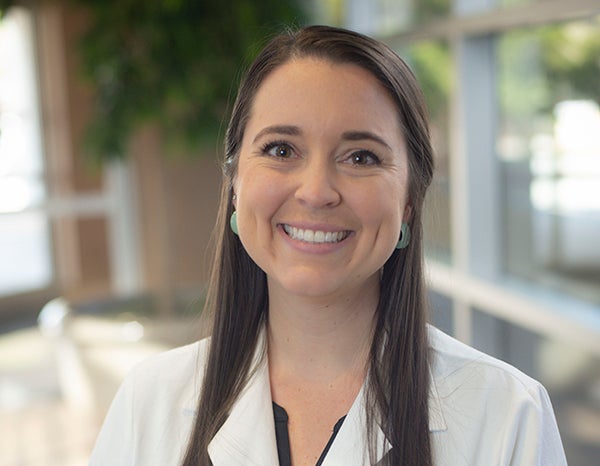When to See an OB-GYN
January 29, 2025
By: WakeMed Children's Hospital
Categories: Women's, Children's
In the preteen years, parents are likely to start wondering when their daughter should have their first appointment with a gynecologist. Anna Fleischman, MD, WakeMed OB-GYN, says it really depends on girls’ health, needs and concerns as well as what their pediatrician is comfortable diagnosing and treating.
Age Recommendations
The American College of Obstetricians and Gynecologists recommends teen girls start seeing an OB-GYN between the ages of 13 and 15 unless health concerns arise at a younger age. If a teen girl is sexually active or in a serious relationship, visiting an OB-GYN is also recommended. The age recommendation for cervical cancer screening is 21. Regardless of concerns, proactively setting up a visit with an OB-GYN can provide teen girls with a safe place to talk, a better understanding of their developing bodies, and advice on how to take good care of their bodies.
Common Concerns
“The most common reason we initially see preteen or teen girls for their first visit is for some menstrual cycle irregularity,” said Dr. Fleischman. “Other common reasons include menstruating at an early or delayed age, experiencing intense pain, or struggling with heavy bleeding during menstruation (period).”
Dr. Fleischman says it can be normal for young girls to experience menstrual irregularity in the first year or two with cycles longer than 28-to-30-days, or they may skip a month between periods. After that, the frequency should become more normal.
“If irregularity continues beyond the first year or two, it's likely related to a dysfunction in ovulation, which occurs due to a miscommunication of the hormones and thus an irregularity in the menstrual cycle,” said Dr. Fleischman. “Initial concerns with irregularity can be discussed with a pediatrician who can make a referral to an OB-GYN.”
Menarche (the onset of menstruation) is typically between ages 9 and 15. A delay in menarche, after age 15, or premature menarche, before age 9, can raise flags about possible health issues, and Dr. Fleischman encourages parents to schedule an OB-GYN appointment to discuss and determine what is causing the irregularity.
What OB-GYNS Look for Early On
“Some of the things an OBGYN may look into when evaluating an irregular menstrual cycle include weight, other physical development, and the possibility of anemia or thyroid disease,” said Dr. Fleischman. “We can also check to see if prolactin levels are elevated because that could indicate a possible tumor in the pituitary gland.”
Polycystic ovary syndrome can also be detected at an early age for some girls, as signs and symptoms can begin around the time of puberty. Heavy bleeding during a teen’s period might also be the first event for the diagnosis of an underlying bleeding disorder.
“Structural reasons such as fibroids or polyps (uterine or endometrial) or cancer may also be of concern,” said Dr. Fleischman. “While less likely, some cancers can be more common in adolescence so it’s best to take symptoms seriously and make an appointment to determine what’s going on and hopefully avoid more serious problems in the future.”
Alleviating Anxiety
Parents and teen girls may have some anxiety about a first OBGYN visit. Dr. Fleischman says families should know that the initial visit to an OB-GYN will rarely involve a pelvic or vaginal exam. First visits are more likely to involve a general physical exam (height, weight and blood pressure), a review of medical history, assessment of any concerning patterns, and possibly some lab work.
Reasons that might warrant additional physical exams include vaginal itching, burning, pain or excessive discharge, which Dr. Fleischman says could be due to a foreign object such as tissue paper.
“They may not need a speculum exam, but some type of exam may be needed in these cases,” said Dr. Fleischman. “Concerns about STDs may involve speculum exam.” If a teen has particularly high anxiety, they may be able to elect sedation for an exam. “Teens can also request to have their parents with them for appointments and during physical exams, but a portion of history will be taken without parents present,” said Dr. Fleischman. “This allows patients to privately express any existing health and safety concerns.”
Talking About The Body
Dr. Fleischman wants parents to know it’s important to really listen to their teens and teach them to take care of and pay attention to their bodies. “It’s important to set the example and normalize talking about our bodies with proper terminology,” said Dr. Fleischman.
Always address any questions or concerns your kids have with sincerity and honesty. If they are experiencing anything of concern, don’t hesitate to make an appointment for them.
“Never ignore complaints of pain or excessive menstrual blood loss that interferes with their social life or physical well-being,” said Dr. Fleischman. “They shouldn’t be missing school or sitting out of sports, so any concerns along those lines would be best addressed with an appointment to prevent overlooking any health concerns.”
About Anna Fleischman, MD, FACOG
Dr. Fleischman is a board-certified obstetrics and gynecology physician with clinical interests in full spectrum OB-GYN care for all ages, low/high risk obstetrics, patient education and minimally invasive gynecologic surgery including robotic, vaginal and laparoscopic techniques.
This is reprinted from Families First. If you would like a hard copy, fill out our online form to subscribe.